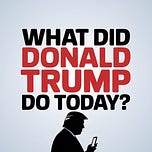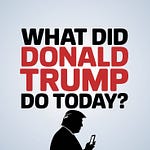Donald Trump’s recent Truth Social posts and associated administrative actions showcased a blend of impulsive rhetoric, factual distortion, and a governing style that repeatedly blurred the line between public service and personal benefit. His post urging Ukraine to accept a meeting with Vladimir Putin in Turkey exemplified a diplomatically naïve and historically distorted worldview. By demanding immediate negotiations and treating both Russia and Ukraine as moral equals, Trump ignored the realities of Russian aggression and ongoing multilateral peace efforts. He further muddied the waters with a misleading historical claim about World War II, promoting American exceptionalism at the expense of historical accuracy. In another post, Trump falsely asserted that 21 million undocumented immigrants had "invaded" the U.S., characterizing them as violent criminals and attacking the judiciary as “radicalized and incompetent.” His rhetoric attempted to delegitimize judicial oversight and framed his own leadership as the last barrier against national collapse, echoing authoritarian talking points.
Trump’s economic messaging was similarly misleading. He claimed that trillions of dollars and record job numbers had entered the U.S. economy in just three months due to his tariff policies and election victory, despite the fact that tariffs generally raise consumer costs and do not directly generate foreign investment. These assertions lacked economic grounding and appeared designed more to stir partisan loyalty than to inform. Compounding the administration’s ethical controversies, reports emerged that the Trump administration is set to accept a $400 million luxury Boeing 747-8 jet from the Qatari royal family. Although lawyers claimed the gift, intended for eventual transfer to the Trump presidential library foundation, was legal, the arrangement raised serious constitutional and ethical concerns. It effectively used public office to secure a high-value personal legacy item, undermining the spirit of the Constitution’s Emoluments Clause and setting a dangerous precedent for foreign influence.
In international trade, recent U.S.–China talks were described by both sides as positive, yet no concrete outcomes were produced. Tariffs remained untouched, and the promised “consultation mechanism” lacked substance, casting doubt on the effectiveness of the talks. Meanwhile, Transportation Secretary Sean Duffy’s interview on Meet the Press revealed major vulnerabilities in the nation’s airspace infrastructure. While assuring the public that flying was safe, he simultaneously acknowledged outdated radar systems, understaffed control towers, and equipment purchased off eBay—an incoherent message that eroded public confidence. His answers lacked specificity and clarity, and his evasiveness about Elon Musk’s role in budget decisions raised further concerns. Similarly, Commerce Secretary Howard Lutnick, in an interview on CNN, failed to substantiate the administration’s tariff strategy, offering vague platitudes instead of concrete details. He misrepresented the nature of trade deficits and the effects of tariffs, contradicted himself on the future of Chinese imports, and leaned heavily on political slogans. These actions and statements reflected an administration focused more on emotional appeal and political optics than on coherent policy, governance, or factual integrity.













Share this post